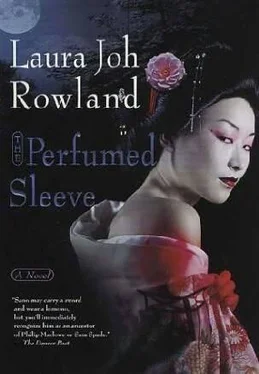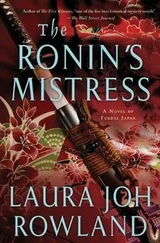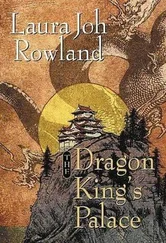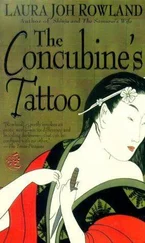
Laura Joh Rowland
The Perfumed Sleeve
The ninth book in the Sano Ichiro series, 2004
To Kathleen Davis, Elora Fink, Charles Gramlich,
Steve Harris, Candice Proctor, and Emily Toth,
in gratitude for their company on Monday nights,
their friendship, and their support
Japan, Genroku Period, Year 7, Month 10 (November 1694)
News of trouble sent Sano Ichirō abroad in the city of Edo at midnight. Clad in armor and metal helmet, his two swords at his waist, he galloped his horse down the main avenue. Beside him rode his young chief retainer, Hirata; behind them followed the hundred men of Sano’s detective corps.
Constellations wheeled around the moon in the black, smoke-hazed sky. Cold wind swept debris past closed shops. Ahead, Sano saw torches flaring against the darkness. He and his troops passed townsmen armed with clubs, standing guard at doorways, ready to protect their businesses and families from harm. Frightened women peered out windows; boys craned their necks from rooftops, balconies, and fire-watch towers. Sano halted his army at the edge of a crowd that blocked the avenue.
The crowd was composed of ruffians whose faces shone with savage glee in the light of the torches they carried. They avidly watched two armies of mounted samurai, each some hundred men strong, charge along the street from opposite directions. The armies met in a violent clash of swords and lances. Horses skittered and neighed. The riders bellowed as they swung their blades at their opponents. Men screamed in agony as they fell wounded. Groups of samurai on foot whirled in fierce sword combat. Spectators cheered; some joined in the carnage.
“I’ve been expecting this,” Hirata told Sano.
“It was only a matter of time,” Sano agreed.
As the shogun’s sōsakan-sama-most honorable investigator of events, situations, and people-Sano usually occupied himself with investigating important crimes and advising his lord, Tokugawa Tsunayoshi, dictator of Japan. But during recent months he’d spent much time keeping order amid the political upheaval in Edo. The bakufu-the military government that ruled Japan -was divided by a struggle for control of the Tokugawa regime. One faction, led by the shogun’s second-in-command, Chamberlain Yanagisawa, opposed a second led by Lord Matsudaira, a cousin of the shogun. Other powerful men, including the daimyo-feudal lords-had begun taking sides. Both factions had started building up their military forces, preparing for civil war.
Soldiers had poured into Edo from the provinces, crowding the barracks at daimyo estates and Edo Castle, overflowing the district where Tokugawa vassals lived and camping outside town. Although Chamberlain Yanagisawa and Lord Matsudaira hadn’t yet declared war, the lower ranks had grown restless. Idle waiting bred battle fever. Sano and his detective corps had already quelled many skirmishes. Now, the city elders who governed the townspeople had sent Sano an urgent message begging him to come and quell this major disturbance that threatened to shatter the peace which the Tokugawa regime had maintained for almost a century.
“Let’s break up this brawl before it causes a riot and wrecks the town,” Sano said.
“I’m ready,” Hirata said.
As they forged through the crowd, leading their troops, Sano recalled other times they’d ridden together into battle, when he’d taken Hirata’s competent, loyal service for granted. But last summer, while they were attempting to rescue the shogun’s mother and their wives from kidnappers, Hirata had disobeyed Sano’s orders. Now Sano could no longer place his complete trust in Hirata.
“In the name of His Excellency the Shogun, I order you to cease!” Sano called to the armies.
He and his men forced apart the combatants, who howled in rage and attacked them. Blades whistled and slashed around Sano. As he circled, ducked, and tried to control his rearing horse, the night spun around him. Torchlight and faces in the crowd blurred across his vision. The armies drove him to the edge of the road.
“Behold the great sōsakan-sama,” called a male voice. “Have you been demoted to street duty?”
Sano turned to the man who’d addressed him. It was Police Commissioner Hoshina, sitting astride his horse at the gate to a side street, flanked by two mounted police commanders. Fashionable silk robes clothed his muscular physique. His handsome, angular face wore a mocking smile.
“You shouldn’t lower yourself to breaking up brawls,” Hoshina said.
Anger flashed through Sano. He and Hoshina were longtime enemies, and the fact that Sano had recently saved Hoshina’s life didn’t ease their antagonism.
“Someone has to uphold the law,” Sano retorted, “because your police force won’t.”
Hoshina laughed off Sano’s accusation that he was neglecting his duty. “I’ve got more important things on my mind.”
Things like revenge and ambition, Sano thought. Hoshina had been the paramour of Chamberlain Yanagisawa until recently, when Yanagisawa had betrayed Hoshina, and the police commissioner had joined Lord Matsudaira’s faction. Hoshina was so bitter toward Yanagisawa that he welcomed a war that could elevate him and depose his lover. He didn’t care that war could also destroy the city he’d been appointed to protect. A lawless atmosphere pervaded Edo because Hoshina and his men wouldn’t stop the fighting between partisans.
Sano turned away from Hoshina in disgust. Along the boulevard, more soldiers and ruffians streamed in as news of the brawl spread. Running footsteps, pounding hoof beats, and loud war cries enlivened the night.
“Close off the area!” Sano yelled at his troops.
They hurried to bar the gates at intersections. The boulevard was a tumult of Sano’s forces and the crazed soldiers colliding, blades flashing and bodies flailing, murderous yowls and spattering blood. As Sano rode into the melee, he feared this was only a taste of things to come.
It was dawn by the time Sano, Hirata, and the detectives separated the combatants, arrested them for disturbing the peace, and dispersed the crowd. Now a sun like a malevolent red beacon floated up from a sea of gray clouds over Edo Castle, looming on its hilltop above the city. At his mansion inside the official quarter of the castle, Sano sat in his private chambers. His wife Reiko cleaned a cut on his arm, where a sword had penetrated a joint in his sleeve guard. He wore his white under-kimono; his armor lay strewn on the tatami floor around him.
“You can’t keep trying to maintain order in the city by yourself,” Reiko said as she swabbed Sano’s bloody gash. Her delicate, beautiful features were somber. “One man can’t stand between two armies and survive for long.”
Sano winced at the pain. “I know.”
Servants’ voices drifted from the kitchen and grounds as morning stirred the estate to life. In the nursery, Sano and Reiko’s little son Masahiro chattered with the maids. Reiko sprinkled powdered geranium root on Sano’s wound to stop the bleeding, then applied honeysuckle ointment to prevent festering.
“While you were out last night, the finance minister came to see you,” Reiko said. “So did the captain of the palace guard.” These were two of Sano’s friends in the bakufu. “I don’t know why.”
“I can guess,” Sano said. “The minister, who has recently joined Chamberlain Yanagisawa’s faction, came to ask me to do the same. The captain, who has sworn allegiance to Lord Matsudaira, would like me to follow his example.”
Читать дальше













